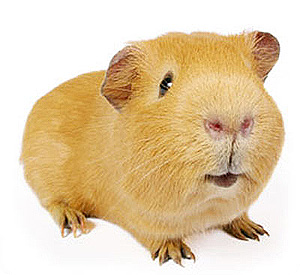GUINEA PIG Diseases

GUINEA PIG Parasites
Mange, Ringworm, Lice and Ciccodioses
Mange
Mange is a common parasitic disease that affects the skin of guinea pigs. This parasite can cause skin irritations and hair loss in large clumps on the back of the guinea pigs. If you suspect your pet is afflicted with mange, it is best to pay a visit to your veterinarian for further examination. While mange is treatable, an illness involving hair loss could indicate further problems, either internal or external.
Ringworm
Ringworm is a skin parasite that can cause skin irritation and hair loss around the head, neck and nose of the guinea pig. This parasite generally infects young guinea pigs and is transferable from one guinea pig to another and can be transferred from the pet to its owner. Always use caution when handling guinea pigs that you suspect may have contracted ringworm and always wash your hands before and after handling your pet.
To treat ringworm, take your guinea pig to your veterinarian – ringworm is typically treated by either topical or oral medication
Lice
Lice is a skin parasite that lives by biting and sucking blood from the guinea pig – they are generally found attached to the hair follicles. Lice can cause sores, hair loss and severe skin irritation and itching. If you suspect your pet has lice, use caution when handling your pet as lice can be transferred from pet to human. Always wash your hands before and after handling your pet.
Lice is generally treated by a medicated shampoo. Before beginning treatments, always consult with your veterinarian.
Ciccodioses
Ciccodioses is a liver and intestinal disease caused by a single celled parasite. Guinea Pigs typically contract this disease by consuming food or water that has been contaminated with feces. Physical response to this type of disease depends on a number of factors and can be manifest in a number of ways. Guinea pigs infected with ciccodia can experience blood in the feces and diarrhea, and become dehydrated and experience weight loss. Pet owners should seek the help of a veterinarian to treat this illness.
GUINEA PIG Diseases
Scurvy (Vitamin C Deficiency)
Guinea pigs bodies do not produce vitamin C and therefore must consume an adequate supply of it from fresh fruits and vegetables and meal supplements. Vitamin C deficiency can cause scurvy, causing lethargy, weak and disfigured bone and teeth development, swollen joints, reluctance to move, and spontaneous bleeding from the gums. Guinea pigs that are experiencing these symptoms should be seen by a veterinarian. Scurvy can be reverse through diet changes or vitamin C injections.
Pet owners choosing to supplement the diet with pellets loaded with vitamin C should be sure to keep the pellets in a cool, dry, dark place as vitamin C will deteriorate if left in direct sunlight or prolonged heat.
Hair Loss
Hair loss in guinea pigs occurs at various times in the guinea pig’s life cycle. Breeding females and weaning infants may experience hairloss – over time the hair will return on its own. Additionally, as young guinea pigs mature and establish their place in the breed’s pecking order, more dominant guinea pigs may chew off the hair of the less aggressive guinea pigs in the litter. Hair can also be lost because of fungal disease and external parasite infestations.
Cancer
Cancer is rare among guinea pigs – typically only older guinea pigs are affected. Most tumors are benign and involve the skin and respiratory tract lining. Cancer may also affect the reproductive tract, mammary glands (breasts) and blood (leukemia).
Pneumonia
The most common bacterial diseases in pet guinea pigs is Pneumonia. Pneumonia is caused by bacteria that inhabit the respiratory tracts of guinea pigs. This disease is generally caused by stress, inadequate diet, and improper care. When a guinea pig contracts pneumonia they may experience labored or rapid breathing, fluid from eyes and nostrils, laying down, rolling, a lack of desire to eat and lethargy.
If you suspect your guinea pig has pneumonia, contact a veterinarian immediately as death can occur suddenly. Treatments include antibiotic injection and rest.
It is important to note that the most common pneumonia causing bacteria in guinea pigs is natural flora for rabbits and rats – if rabbits and rats are kept as pets in the same home, they must be kept away from each other.
| |
Other Categories
GUINEA PIG Pet Care
GUINEA PIG Health Information
GUINEA PIG Diseases
GUINEA PIG Babies
GUINEA PIG Products
Main Categories
DOGS
CATS
HORSES
BIRDS
RABBITS
HAMSTERS
MICE AND RATS
GUINEA PIGS
FISH
|

